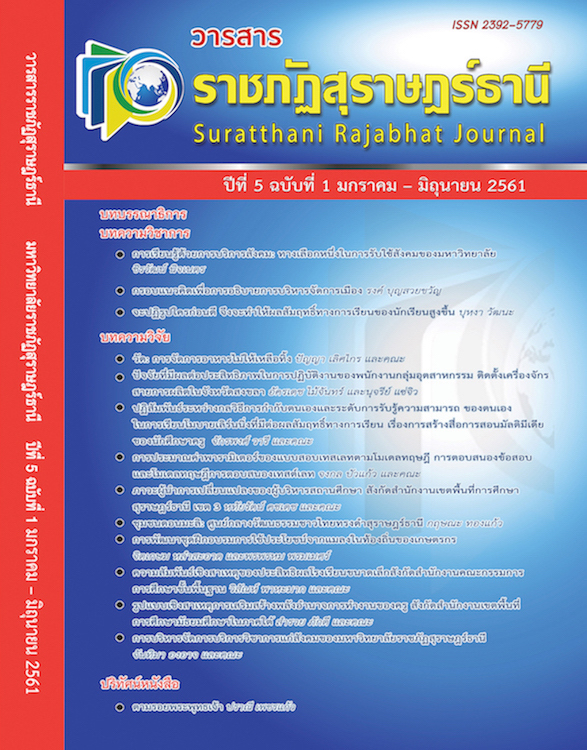Buddhist Temples : the Management of Leftover Meals
Main Article Content
Abstract
This study aims to 1) study the activity learning process about food’s tradition and 2) study the development’s process the activity management about food’s tradition pattern. It used the Qualitative Research such as lessons learned, analysis, and synthetic of the development about environment solving the problems. Then, the social movements of the Dharma group were applied.
The research result found that learning activity was results of wisdoms and taking learned lessons after practicing with the scholar monks of temple, trying to think and analysis by talking and chatting with knowers and experienced persons to ensure the process. Then, it was developed to an experiment including periodical evaluating. Thus, learning was based on the knowledge base and daily practice.
The activity pattern development process about food’s tradition of lesson learned and development found that the learning will be analysis of how to be self-management leading to do a small experiment and evaluation. Then, the results will lead to consult with knowledgeable people and experts, periodically. After that, the process will be developed and re-apply, thus, it is called “Spiral Model” for better improvement.
Overview, the Dharma group has learned academic guidelines combining with the idea that wisdom exists to create a management model based on its own (Self-directed learning). Taking trial and improve that the food including fresh and dried food and others were utilized cost-effectively and benefit for monks, students, and people around the community.
Article Details
References
กรมการพัฒนาชุมชน. (2549). นวัตกรรมแก้จน เล่มที่ 1 : การจัดการความรู้สำหรับ นักพัฒนา. กรุงเทพฯ : กรมการพัฒนาชุมชน กระทรวงมหาดไทย.
ปัญญา เลิศไกร. (2552). นวัตกรรมการปลูกปาล์มน้ำมัน ลุ่มน้ำปากพนัง นครศรีธรรมราช. วิทยานิพนธ์ปรัชญาดุษฎีบัณฑิต สาขาการศึกษาเพื่อการพัฒนาท้องถิ่น มหาวิทยาลัยราชภัฏนครศรีธรรมราช.
ปัญญา เลิศไกร และลัญจกร นิลกาญจน์. (2559). การเก็บข้อมูลวิจัยชุมชนภาคสนาม. วารสารนาคบุตรปริทรรศน์ ปีที่ 8 ฉบับที่ 2 กรกฎาคม - ธันวาคม 2559 นครศรีธรรมราช : มหาวิทยาลัยราชภัฏนครศรีธรรมราช.
ปรีชา สามัคคี และปัญญา เลิศไกร. (2557). การสังเกต 360 องศาเพื่อการวิจัยและ พัฒนา. วารสารนาคบุตรปริทรรศน์ ปีที่ 6 ฉบับที่ 1 มกราคม - มิถุนายน นครศรีธรรมราช : มหาวิทยาลัยราชภัฏนครศรีธรรมราช.
ลัญจกร นิลกาญจน์. (2557). การพัฒนารูปแบบการเรียนรู้. วารสารนาคบุตรปริทรรศน์ ปีที่ 6 ฉบับ ที่ 2 กรกฎาคม-ธันวาคม นครศรีธรรมราช : มหาวิทยาลัยราชภัฏ นครศรีธรรมราช.
วรดี เลิศไกร จรุงใจ มนต์เลี้ยง และสุชาดา จิตกล้า. (2559). การจัดกิจกรรมของเล่นภูมิปัญญา เพื่อพัฒนาเด็กปฐมวัย กรณีเทศบาลตำบลทอนหงส์ อำเภอพรหมคีรี จังหวัด นครศรีธรรมราช. วารสารนาคบุตรปริทรรศน์ ปีที่ 8 ฉบับที่ 1 มกราคม - มิถุนายน 2559 นครศรีธรรมราช : มหาวิทยาลัยราชภัฏนครศรีธรรมราช.
วิเชียร วิทยอุดม. (2554). การจัดการสมัยใหม่. กรุงเทพฯ : ธนชัช การพิมพ์.
สิน พันธุ์พินิจ. (2556). เทคนิคการวางแผนและประเมินโครงการ. กรุงเทพฯ : วิทยพัฒน์.
Ann R. J. Briggs, M. C. and Marlene M. (2012). Research Methods in Educational, Leadership and Management. California : SAGE publication.
Barney G. G. (1978). Advances in the Methodology of Grounded Theory Theoretical sensitivity University of California San Francisco.
Best, J. W. and Kahn V. (2006). Research in Education University of Illinois at Chicago.
Finberg. H.P.R., ed. (1962). Approaches to History, A Symposium. University of Toronto press.
Kolb, D.K. (1984). Experiential Learning : Experience as the Source of Learning and Development. New Jersey : Prentice-Hall.
Louvered, J. J. (1988). Analyzing Decision Making. California : Sage Publications.
Roger, E. M. (1983). Diffusion of Innovation. New York : Free Press.


